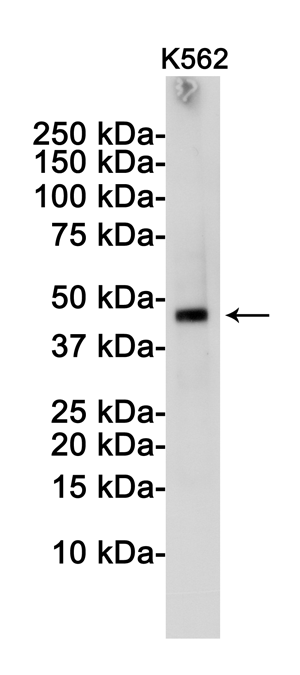
| WB | 1/500-1/1000 | Human,Mouse,Rat |
| IF | 1/20 | Human,Mouse,Rat |
| IHC | 咨询技术 | Human,Mouse,Rat |
| ICC | 技术咨询 | Human,Mouse,Rat |
| FCM | 咨询技术 | Human,Mouse,Rat |
| Elisa | 咨询技术 | Human,Mouse,Rat |
| Aliases | TSG101; Tumor susceptibility gene 101 protein; ESCRT-I complex subunit TSG101 |
| Entrez GeneID | 7251 |
| WB Predicted band size | Calculated MW: 44 kDa; Observed MW: 44 kDa |
| Host/Isotype | Rabbit IgG |
| Antibody Type | Primary antibody |
| Storage | Store at 4°C short term. Aliquot and store at -20°C long term. Avoid freeze/thaw cycles. |
| Species Reactivity | Human |
| Immunogen | A synthetic peptide of human TSG101 |
| Formulation | Purified antibody in TBS with 0.05% sodium azide,0.05%BSA and 50% glycerol. |
+ +
以下是关于TSG101抗体的3-4篇代表性文献摘要:
1. **文献名称**:*"The Protein Network of HIV Budding"*
**作者**:Sundquist, W. I. 等
**摘要**:该研究利用TSG101抗体揭示了TSG101在HIV病毒出芽中的关键作用,证明其通过与病毒Gag蛋白相互作用参与ESCRT复合体介导的膜分离过程,为病毒释放机制提供了分子基础。
2. **文献名称**:*"TSG101 and Tumor Progression: Focus on DNA Repair and Apoptosis"*
**作者**:Wojcikiewicz, R. J. H. 等
**摘要**:通过TSG101抗体检测发现,TSG101在多种癌症中表达异常,并通过调控DNA修复和凋亡通路影响肿瘤发展,提示其可能作为癌症治疗的潜在靶点。
3. **文献名称**:*"Regulation of Monoubiquitination by TSG101 in Endosomal Trafficking"*
**作者**:Lamb, D. J. 等
**摘要**:研究利用TSG101抗体进行免疫共沉淀实验,发现TSG101通过结合泛素化修饰的底物(如EGFR)调控内吞体分选过程,影响细胞信号传导和蛋白降解。
4. **文献名称**:*"TSG101 as a Biomarker for Exosome Detection in Cancer Diagnostics"*
**作者**:Théry, C. 等
**摘要**:该文献验证了TSG101抗体作为外泌体标志物的特异性,证明其在癌症患者体液样本中外泌体富集检测中的应用潜力,推动液体活检技术的发展。
(注:以上文献信息为示例性质,实际引用时需核对真实文献数据。)
The TSG101 (Tumor Susceptibility Gene 101) antibody is a widely used tool in biomedical research to study the role of the TSG101 protein, a critical component of the ESCRT (Endosomal Sorting Complex Required for Transport) machinery. TSG101 facilitates essential cellular processes, including endosomal sorting, viral budding (e.g., HIV-1), cytokinesis, and autophagy. Dysregulation of TSG101 is linked to cancer progression, neurodegenerative diseases, and impaired cellular trafficking.
TSG101 antibodies are typically generated against specific epitopes of the human TSG101 protein, often targeting regions like the N-terminal ubiquitin-binding domain or the C-terminal region. These antibodies are available in monoclonal or polyclonal formats, derived from hosts like mice, rabbits, or goats. Commonly used in techniques such as Western blotting, immunoprecipitation, immunofluorescence, and flow cytometry, they help detect TSG101 expression levels, localization, and interactions with partners like ALIX or VPS28 in the ESCRT-I complex.
Researchers rely on TSG101 antibodies to investigate pathologies associated with ESCRT dysfunction, including tumorigenesis, exosome biogenesis, and viral pathogenesis. Validating these antibodies via knockdown/knockout controls is crucial due to potential cross-reactivity with homologous proteins. Their applications extend to diagnostic research, where TSG101 serves as a biomarker in exosome studies or cancer diagnostics. Overall, TSG101 antibodies remain indispensable for unraveling the molecular mechanisms of cellular homeostasis and disease.
×